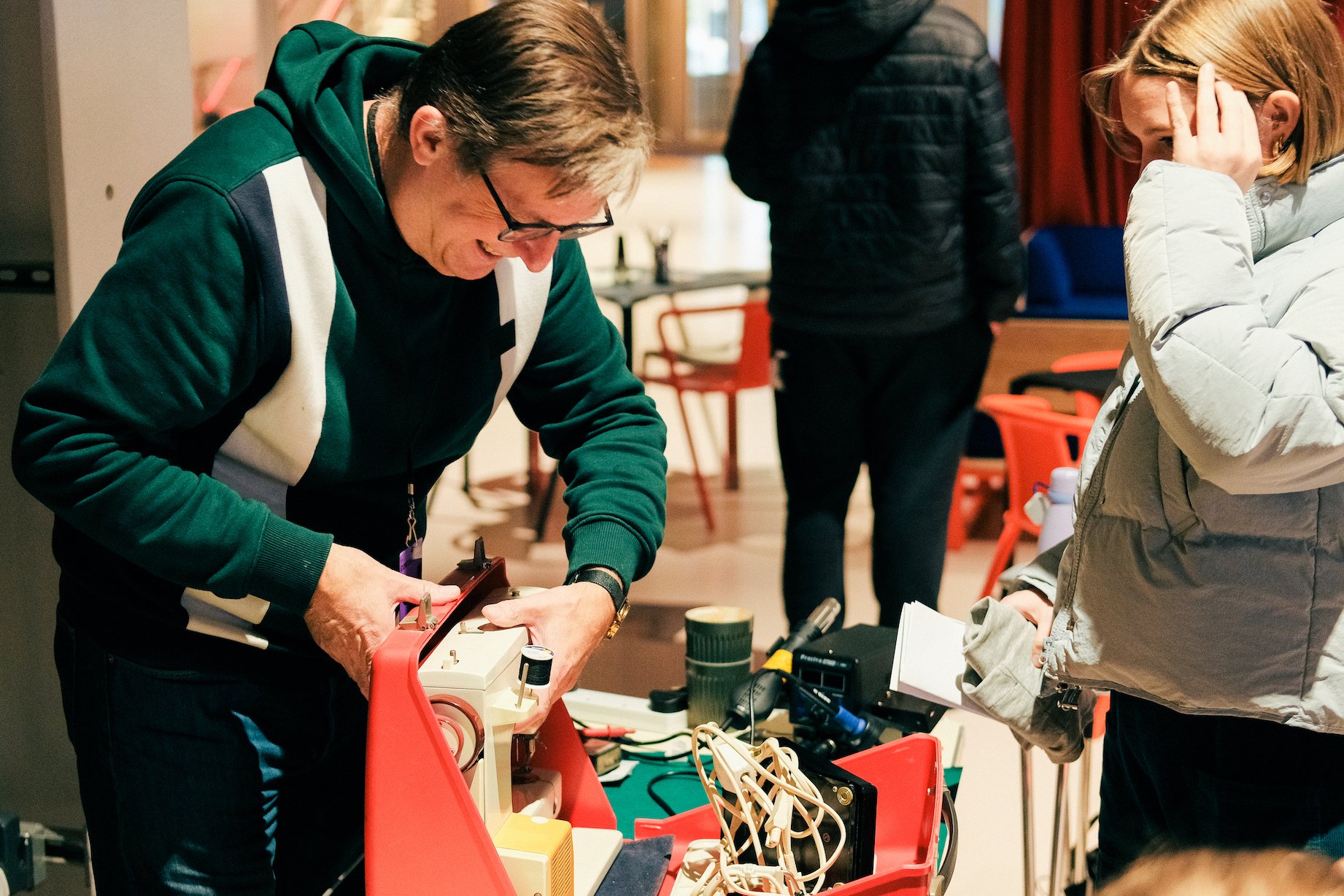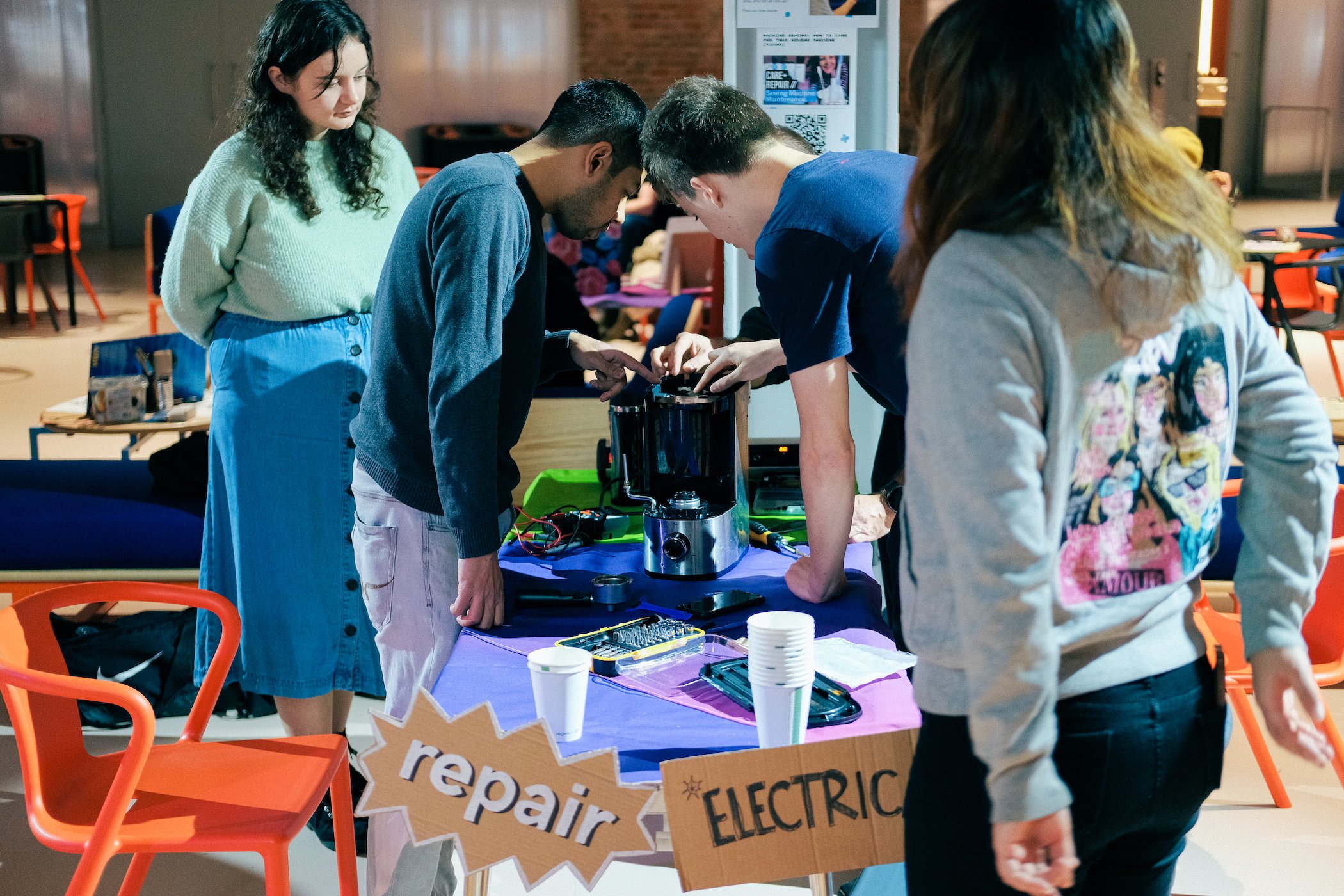Case Study: Tackling e-waste with Factory International
Repair cafe's UNITE! Our broken and unwanted electronics were piling up, but with the help of four fantastic local repair café's, Factory International sparked some fresh ideas for a new waste-free reality…
Tackling e-waste
For 2023’s annual International Repair Day, In Our Nature supported Factory International to host a repair event at Aviva Studios as part of our first round of Community Support.
Collaborating with four Greater Manchester Repair Cafés; Stitched Up, Boiler House, Boothstown Repair Café and Levenshulme Repair Café, and joined on the day by Hubbub’s e-cargo bike, The Restart Project and Suez, Factory International created a free, open-access repair event focussed on e-waste, inspired by their opening show “Free Your Mind”.
The aim of the event was to promote climate action and encourage people to make different choices about their broken electronics and items.
Choice isn’t an illusion
Unlike The Matrix - the inspiration behind Factory International’s “Free Your Mind” show - choosing what to do with our broken items isn’t an illusion. We can either throw them away, or we can give them new life. Repair events like this one help to give people that choice by teaching them new skills, providing access to tools and equipment, and providing specialist advice.
“My idea for organising a technology-focused repair event, as part of the public programme of Free Your Mind, was inspired by the reflection that
The Matrix showed us what happens when machines take over.
We’re delighted to provide a platform for repair in Greater Manchester, bringing together the four current repair cafés and inspiring our audiences and communities to take positive climate action. To host it on International Repair Day was the icing on the cake!”
Feimatta Conteh, Environmental Sustainability Manager at Factory International
Down the rabbit hole
What's the problem with e-waste? Let’s take a closer look...
Our electronics contribute to carbon emissions in all stages of their life cycle: during the extraction of the materials used to create them, in their production and in their disposal. They also contain a mixture of toxic substances and precious materials which are difficult to extract and dispose of.
It’s a growing issue, as each year more and more electronics are being produced and thrown away. According to a report from the Platform for Accelerating the Circular Economy (PACE) and the UN E-Waste Coalition by 2050 it’s predicted that global e-waste production is on track to reach 120 million tonnes per year.
The UK alone currently produces about 1 million tonnes of e-waste a year, and there’s substantial ‘hoarding’ of valuable metals in unused appliances. It’s estimated that we have enough cables held in our homes to wrap around the world 5 times!
The PACE and UN E-Waste Coalition report also suggests that 80% of our e-waste ends up in landfill or is informally recycled – often by hand in developing countries exposing individuals to substances which are harmful to human health. This means e-waste is not just a climate and environmental issue, but also a social justice issue too.
By making the most of the electronics we already have and repairing them when they break, we are helping to reduce their negative impact in lots of different ways.
Carbon savings
Factory International saved five items in total, weighing 13.1kg and saving 77.85kg CO2.*
The repaired items were:
A kettle
A fairy house
A filter coffee machine
A sewing machine
Half a kilo of clothing
Community impact
Five people benefitted directly from having their items repaired, and the event itself was attended by 40 individuals in total.
80% of the individuals who brought an item to be repaired had never attended a repair café before.
100% of participants would consider attending a repair café in the future, after having participated in this project.
“My grandma gave me this sewing machine and she was always doing DIY, always fixing stuff, never throwing anything away; everything always had another life and an extra use it could be put to, so she’d love this kind of event and she’d be really glad to know her sewing machine is here being fixed.”
Factory International repair workshop participant.
Sparking new ideas
Based on the success of this event, Factory International are keen to explore more collaborations with local repair cafés to host similar events with the possibility of expanding beyond electronics to other items, such as clothes, to further promote sustainability and repair culture.
“People don’t really value their clothes; they’re seen as something that you can throw away and that’s stopping them from repairing it. Repairing your clothes instead of just buying new ones feels like a hassle for some people but it’s really worth it, we have virtually a 100% success rate with repairing clothes, whereas electronics can’t always be fixed.”
Sara, volunteer sewer at Boothstown Repair Café.
Ready to lean into some carbon savings of your own?
Feeling inspired by Factory International’s efforts to help people to tackle their e-waste? Well, there are lots of things we can do at home and in our communites to tackle e-waste too. Visit our resource hub to find out more and explore our tips!
*Our carbon saving calculations: These values are based on the lifecycle environmental impact of producing these items. It therefore assumes a 1:1 replacement value in the use case. This means a repaired item is assumed to replace the need for a brand new item.
There are studies that suggest this is not always the case, that repaired items are not always used as long as new items. There is however no factor that can be applied to account for this possibility. It is possible therefore that this assessment overvalues the actual carbon saving, but it does accurately reflect the potential carbon saving if these items are used as if new.
In addition to the above, electrical appliances are sometimes shown to have lower environmental impact where they are replaced with a new item that is more efficient. In this instance, there are no notable improvements in the efficiency for the appliances repaired during this event, therefore this is not a consideration in this case.







